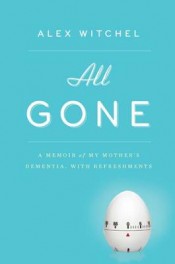As much as I love a good foodie memoir, one of the things that never rings quite true with me is the sophistication of the food — memoirs about food seem, inevitably, to be about people with palates that are more refined than average. But food is memory and family and important even when the only spices used on a roast chicken are garlic powder and Lawry’s Seasoned Salt, as Alex Witchel elegantly and poignantly points out in her memoir All Gone: A Memoir of My Mother’s Dementia, With Refreshments.
At just over 70, Witchel’s mother — smart, loving, independent — started to show early signs up dementia. At first, Witchel tried to be the perfect daughter and fix her mother, making every appointment and being there at every moment. But as it became clear that doctors didn’t have an answer to the illness, Witchel returned to the kitchen for comfort, revising the recipes of her childhood to explore the other ways everything her mother was remained in many small things.
I read All Gone back in September, but it took me until this weekend, with my family’s first Thanksgiving without my grandpa coming up, to really have my thoughts on the book crystallize into something coherent.
As I alluded to before, the part of this book that seemed to resonate with me most were the recipes, something that is not typical when I read memoirs centered around food.The comfort foods that Witchel returns to during her mother’s illness are of the 1960s and 1970s variety of canned staples plus processed ingredients made with technological marvels like the microwave. There’s a recipe for Frankenfurter Goulash with Hebrew National franks and canned tomatoes and tomato sauce, and a meatloaf flavored with tomato soup and corn flakes. These are not sophisticated meals, but their familiarity is what’s important, not necessarily the quality.
(Slightly related, Tom Junod had a lovely essay on this topic in Esquire in 2010).
They’re also the kind of recipes that resonate with me, and will be part of my family’s Thanksgiving dinner this Thursday. My grandma also makes the same, simple dinner every year — turkey, green bean casserole, mashed potatoes, salad, boxed stuffing, canned cranberries, and homemade pie — that means more because it’s what we’ve always eaten. Last year I spent Thanksgiving with the boyfriend’s family where they have a much more elaborate meal; it was delicious, but I also missed the food that felt like Thanksgiving to me because it was familiar.
I’m also really sad that I missed having a last Thanksgiving with my grandpa, although there’s no way any of us could have known that at the time; his illness came on very quickly last spring, and he passed away just a couple of months after he first went to the hospital. I think one of the other implied messages of All Gone goes to that feeling: it’s important to appreciate the people you have when you have them, hold on to their memory when they’re gone (physically or mentally), and not expect miracles from yourself while you do your best for them.
In the end, All Gone was one of those sneaky sorts of books that got into me and grabbed at my heart when I didn’t think it was burrowing in. I remember reading most of it rather impassionately, but then sobbing through the last chapters as Witchel came to terms with her mother’s illness and what it meant for their relationship. I wonder now if that reaction was, at least in part, because of my grandpa and thinking about the end of his life too.
All Gone was a lovely memoir, and a unique addition to the many memoirs about food and the memoirs about losing a parent. Witchel doesn’t cover entirely new territory with the book, but she comes at both traditions in a slightly new way that resonated with me.




Comments on this entry are closed.
This may sound silly but I think this book would strike a chord with me because I just spent 7 months taking care of a dog with dementia. I know it’s not the same and would never imply that it is, but she was a part of our family.
Oh, I don’t think that sounds silly at all. I can definitely see that.
For me Christmas isn’t Christmas without my mum’s roast meal, and like what you talk about here, it’s not the best food in the world, but it’s what it does otherwise. In that way I like the universal sort of nature this book seems to have, the way it is approachable not just as a foodie book. Sorry to hear what happened.
I’m glad you found the right book at the right time for you. It doesn’t matter if the food our families eat is gourmet or processed. The familiarity of it is what makes memories.
My mom has gotten fancier over the years but I still love her dilly bread and Stovetop Stuffing the best. I really like the idea of this book to take some of the pretentiousness out of food writing. I’m all about gushing over purple beans, but this is a major part of the tradition as well.
This book sounds good, but reading about Alzheimer’s is very hard for me. It is my family’s most-feared illness, the most horrifying of all, even though it doesn’t seem to run in the family. I cried most of the way through Still Alice by Lisa Genova.
If you don’t like reading about dementia, then this book would be no good. It’s a terrifying disease, but one my family hasn’t had to deal with extensively yet, thank goodness.
This is a lovely post, Kim.
Great review! I am putting this one on hold.